April 5, 2025 | 12:06 GMT +7
April 5, 2025 | 12:06 GMT +7
Hotline: 0913.378.918
April 5, 2025 | 12:06 GMT +7
Hotline: 0913.378.918
Flanders Investment & Trade (Kingdom of Belgium), in collaboration with the Institute of Meteorology, Hydrology, and Climate Change under the Ministry of Agriculture and Environment, organized a seminar titled "Vietnam - Flanders: Promoting Cooperation in Climate Change Response." The event, hosted on the afternoon of April 3 in Ho Chi Minh City, is one of the key activities within the framework of the Flanders International Climate Action Program (VIKAP), organized by FIT.
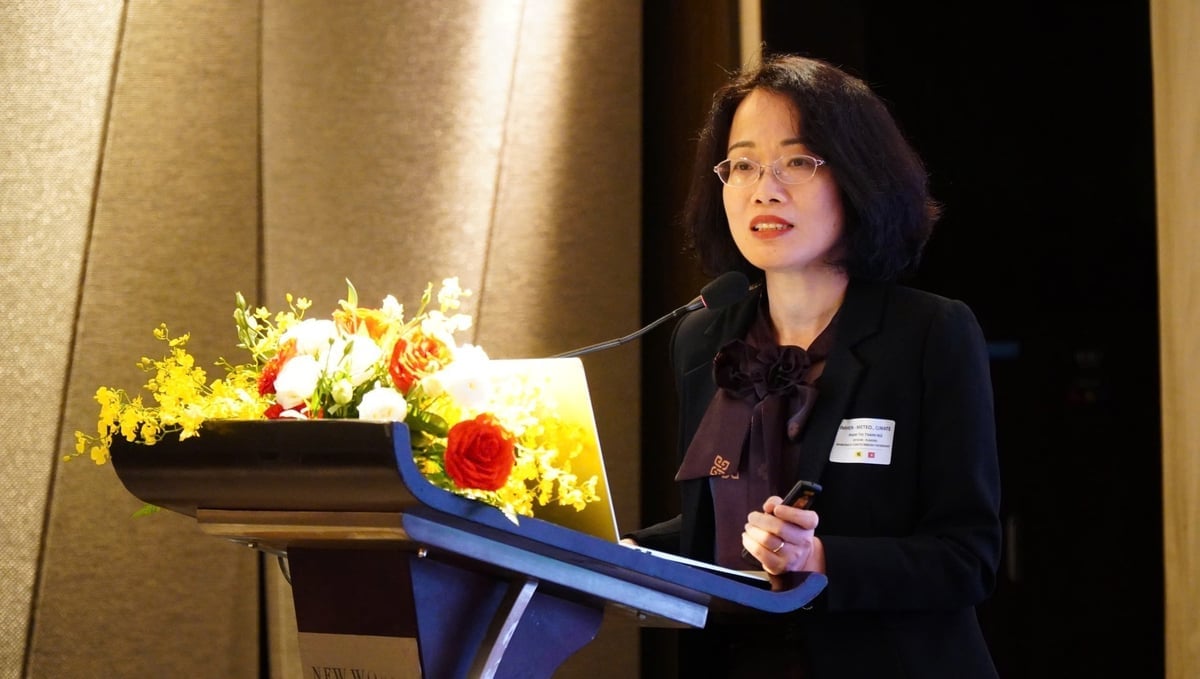
Associate Professor Dr. Pham Thi Thanh Nga, Director of the Institute of Meteorology, Hydrology, and Climate Change, presenting at the seminar. Photo: Ha Duyen.
At the seminar, Associate Professor Dr. Pham Thi Thanh Nga, Director of the Institute of Meteorology, Hydrology, and Climate Change, emphasized that Vietnam is facing severe impacts from climate change. According to estimates by the World Bank (2021), without timely intervention, Vietnam can lose 3 to 5% of its GDP annually by 2050 due to the impacts of climate change. The Mekong Delta, a vital agricultural production region, is under serious threat from rising sea levels and saltwater intrusion. Under the most extreme climate change scenario (RCP 8.5), temperatures can increase by 3-4 degrees Celsius by the end of the 21st century, while sea levels can rise by up to 100 centimeters by 2100. These changes pose a significant risk of flooding for the Mekong Delta and for Ho Chi Minh City as a whole. In response, Vietnam has set a goal of achieving net-zero emissions by 2050 as part of its National Climate Change Strategy.
Associate Professor Dr. Pham Thi Thanh Nga highlighted that climate finance plays a crucial role in implementing adaptation and mitigation strategies. At present, funding for the climate change sector primarily originates from multilateral sources such as the Green Climate Fund (GCF), the Global Environment Facility (GEF), and various development banks such as the World Bank (WB) and the Asian Development Bank (ADB). Additionally, bilateral cooperation programs from organizations such as JICA (Japan), GIZ (Germany), and KOICA (South Korea) contribute to Vietnam’s ongoing climate initiatives. Despite the growing participation from the private sector, their contributions are relatively limited, and the Vietnamese government continues to provide public investment to support climate-related projects.
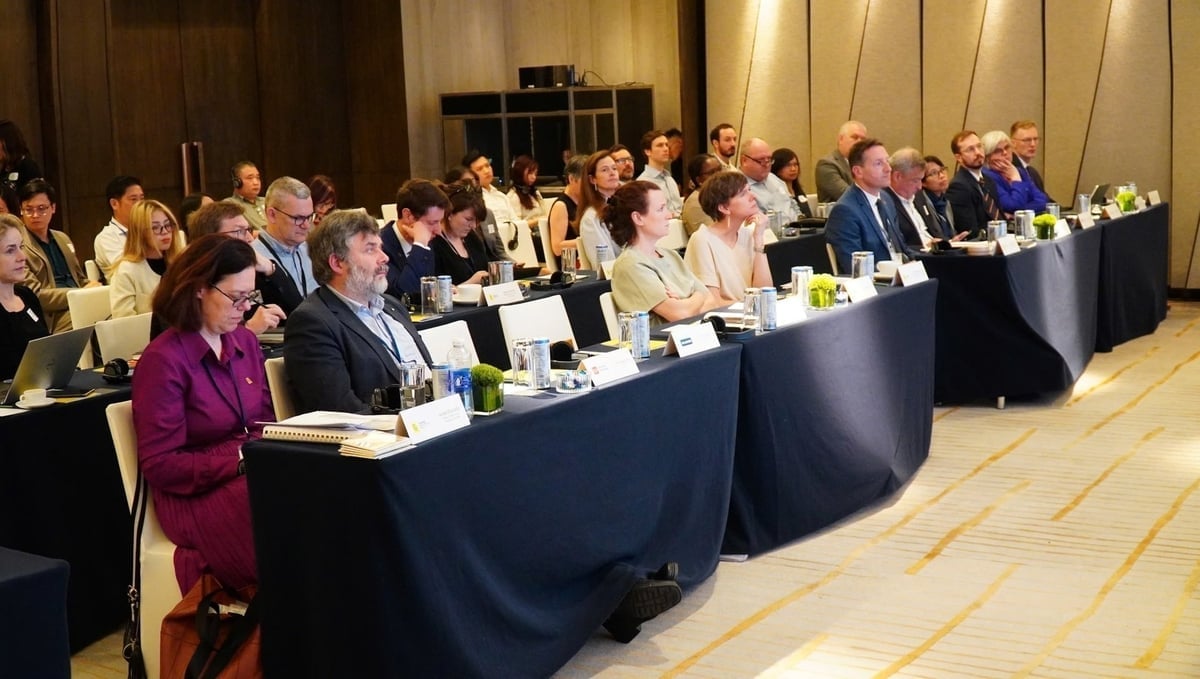
The seminar saw the participation of industry leaders, businesses, and organizations. Photo: H.D.
In the years between 2016 and 2020, the state budget accounted for 16 to 21% of total climate finance. On the other hand, official development assistance (ODA) saw a significant increase, with a 40% increase in allocations to the Mekong Delta and 15% to coastal areas. The sectors receiving the highest financial allocations were energy (44%), sustainable transportation (29%), and agriculture and water resource management (15%). Notable projects include the development of solar power in Ninh Thuan Province, which helps reduce 1.5 million tons of CO2 annually in addition to creating employment opportunities, and a mangrove restoration initiative in the Mekong Delta funded by the Green Climate Fund.
Despite remarkable achievements, Vietnam faces numerous challenges in effectively mobilizing and utilizing climate finance. Only 1% of its GDP is currently allocated to climate change response, while ODA accounts for 31% of total climate finance, which highlights a significant dependence on international funding. Additionally, the pace of project implementation is lengthy, with a 56% delay rate in approvals during the years between 2016 and 2020. Moreover, 76% of the projects saw implementation on a small scale, limiting overall effectiveness. Another challenge is the low level of participation from the private sector, with investments in climate adaptation solutions accounting for less than 10%.
In response to these challenges, Associate Professor Dr. Pham Thi Thanh Nga emphasized the need for more effective solutions in mobilizing and utilizing climate finance. An example includes expanding blended finance models by combining ODA with private sector investments through various mechanisms such as credit guarantees from the World Bank. Additionally, stakeholders should prioritize local budget allocations, with at least 25% of provincial budgets dedicated to key regions such as the Mekong Delta and Central Vietnam. Streamlining administrative procedures, accelerating project approvals, and enhancing the monitoring of implementation progress are some other suggested approaches.
Furthermore, developing attractive financial mechanisms to draw private investment into green projects—such as preferential credit, green bonds, and sustainable investment funds—is an essential strategy.
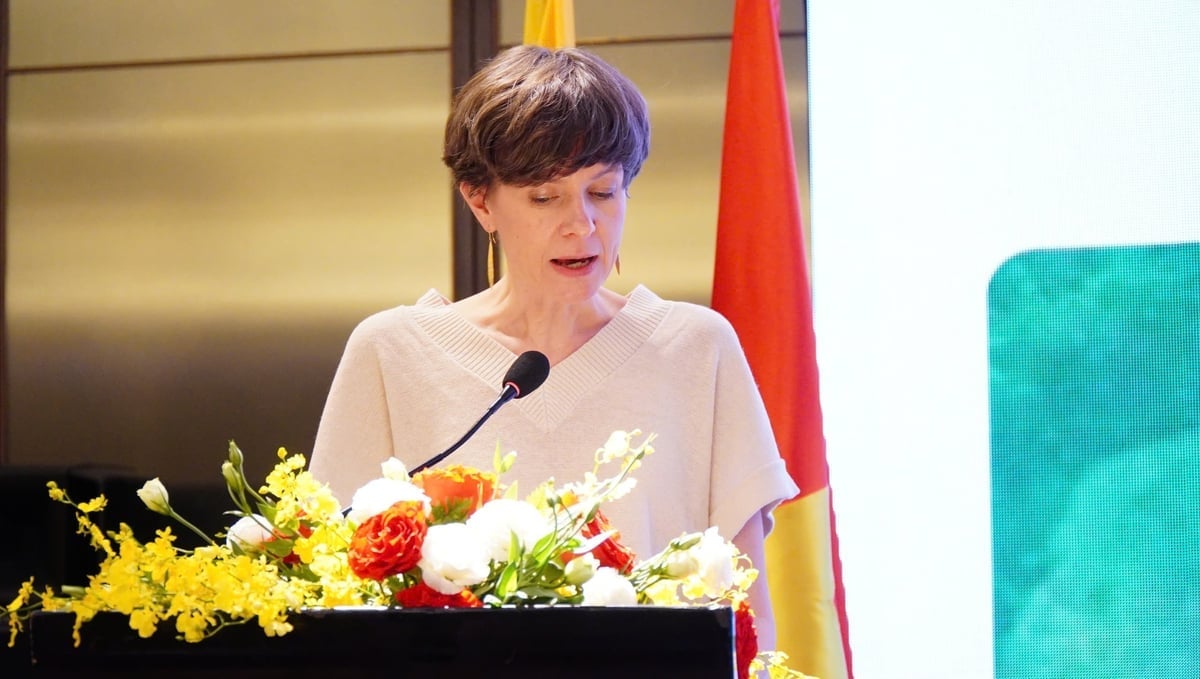
Cieltje Van Achter, Minister for Brussels and Media of the Flanders region, delivering a speech at the seminar. Photo: Ha Duyen.
During the seminar, Cieltje Van Achter, Minister for Brussels and Media of the Flanders region, emphasized that climate change has developed from a distant threat to an urgent reality that directly affects all sectors, from urban planning and food production to transportation. The government of Flanders has actively provided financial support to developing countries, including Vietnam, to implement technology-driven projects and climate adaptation models.
The Flanders Climate Action Program has supported a total of 69 global projects, including five in Vietnam. The government of Flanders has also pledged to invest nearly 3 million euros in climate change response projects in Vietnam. This commitment will enable Vietnam to utilize additional funding from other partners to amplify the impact of implemented initiatives. Flanders established this program on three core principles: sustainable partnerships, the application of innovative technology, and practical actions to mitigate the effects of climate change.
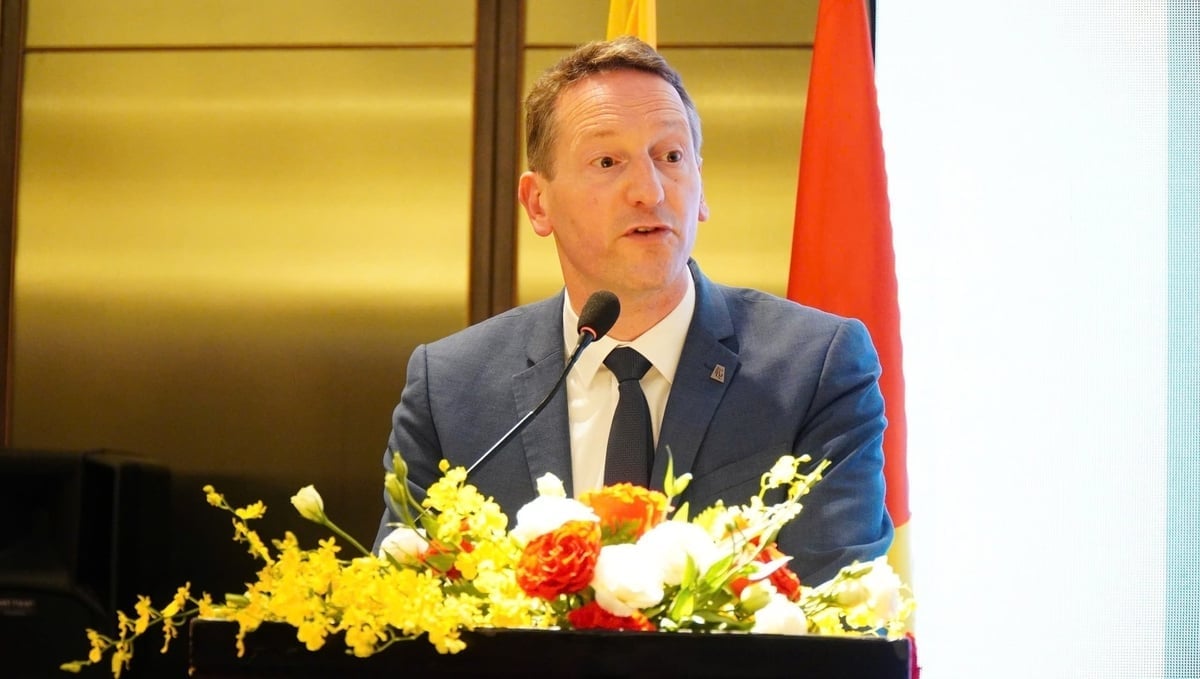
Piet Demunter, Director General of Flanders Investment & Trade, presenting at the seminar. Photo: Ha Duyen.
According to Piet Demunter, Director General of Flanders Investment & Trade, the Belgian government has approved a cooperation agreement among different administrative levels, under which the Flanders region has committed to contributing 68 million euros between 2021 and 2024 through the Flanders International Climate Action Program (FICAP). Under this framework, FICAP projects must focus on climate action, including both emissions reduction and climate adaptation efforts.
One of the key aspects of the VIKAP program is fostering collaboration between governments and the business community. According to Director General Piet Demunter, pilot projects play a crucial role in integrating new technologies into diverse real-world conditions in addition to building sustainable partnerships.
The Director General also noted that FICAP will prioritize support and cooperation in seven key climate-impacting sectors: water, energy, education, agriculture, biodiversity, transportation, and policy support.
"With strong commitments from both parties, this seminar marks a significant milestone in the cooperation between Vietnam and Flanders, moving toward the goal of a sustainable future that adapts to climate change and promotes green economic development," Director General Piet Demunter emphasized.
Translated by Nguyen Hai Long
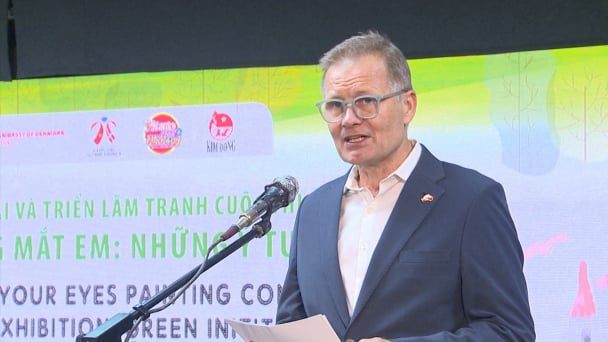
(VAN) The 2024 environmental painting contest Denmark in My Eyes organized under the theme 'Green Ideas' attracted nearly 25,000 Vietnamese students.

(VAN) Validation, certification and issuance of credits up to 250,000 tonnes of carbon dioxide equivalent (CO2e) are forthcoming and will be available in global carbon marketplace.
![Sustainable future for wood industry: [Part 3] Green transformation](https://t.ex-cdn.com/nongnghiep.vn/608w/files/doanhtq/2025/04/01/2558-2129-4jpg-nongnghiep-162120.jpg)
(VAN) One of the solutions for Vietnam's timber industry to achieve sustainable development amid the current challenges is to undergo a green transformation…
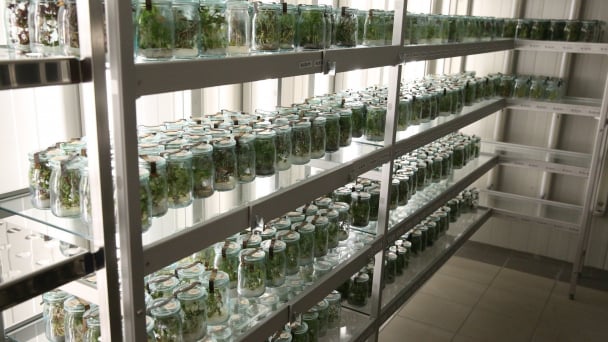
(VAN) Empowering farmers, Indigenous Peoples, local communities and scientists to conserve and use genetic resources is key to resilient agrifood systems.
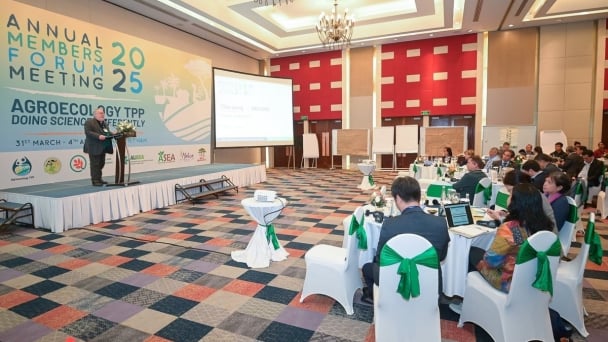
(VAN) Mr. Nguyen Do Anh Tuan, Director of the International Cooperation Department (Ministry of Agriculture and Environment), affirmed that ecological agriculture is a solution for many challenges in the current period.
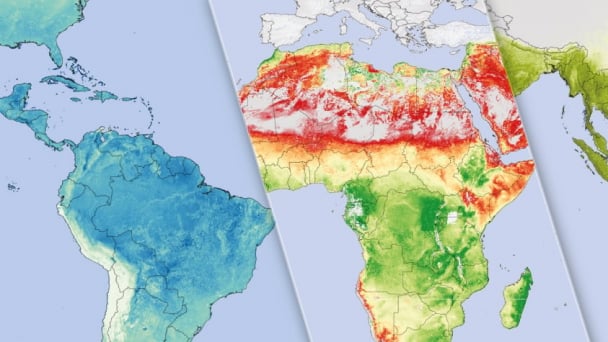
(VAN) The project ‘Drought impact assessment in the Central Highlands’ will leverage remote sensing technology to forecast drought for about 1,500 square kilometers of agricultural production areas.